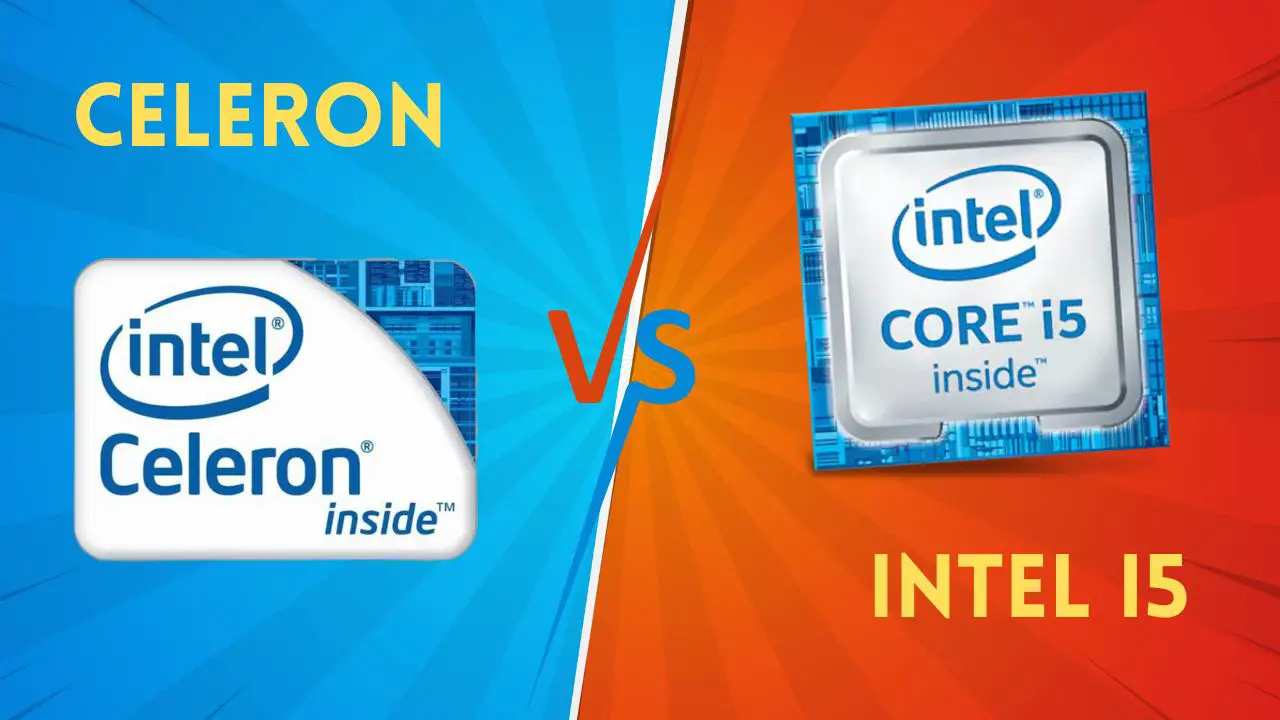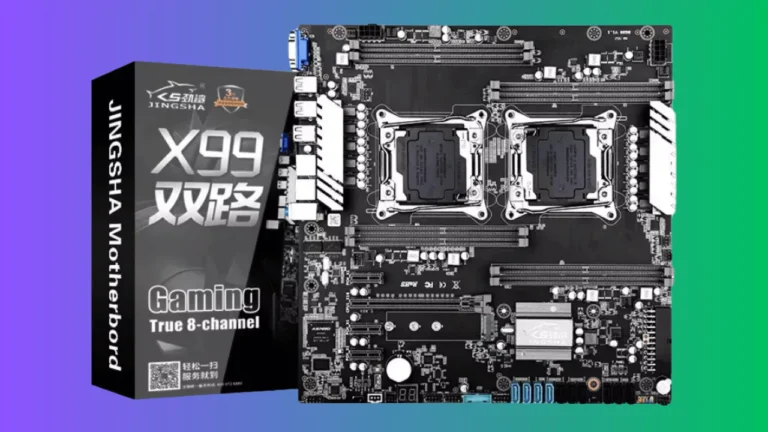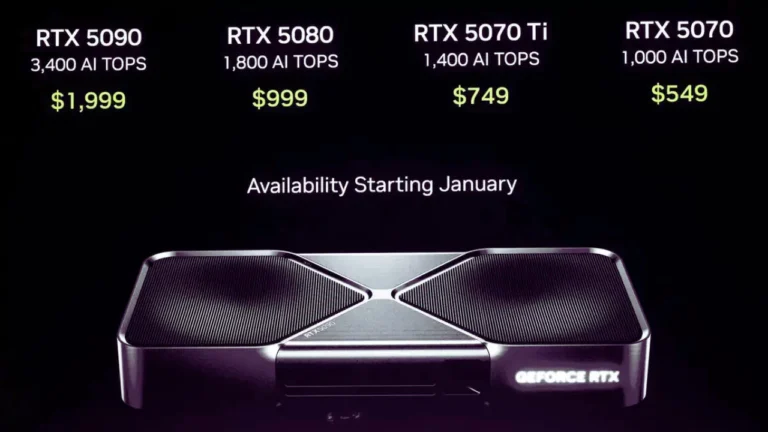Intel Celeron and Intel i5 processors, both popular for personal computers and laptops, exhibit notable distinctions.
The Celeron, a budget processor, and the i5, a mainstream option, can execute basic computer functions.
However, the Celeron’s lower power, having only 2 cores and 2 threads, presents limitations. In contrast, the i5 boasts up to 4 CPU cores and 8 threads, providing increased power.
The Celeron’s maximum operating temperature is also 10°C less than the i5. Furthermore, owning and operating an i5 is costlier than a Celeron.
Regarding RAM support, the i5 accommodates up to 64 GB DDR4-3200 RAM, while the Celeron’s specs might restrict it to less RAM.
Considering these differences is crucial when selecting a processor, as they can influence your computer’s performance.
Here is a more detailed look at the differences between Celeron and i5 processors:
- Celeron processors are low-end and less powerful than i5 processors.
- Celeron processors are less expensive than i5 processors.
- i5 processors are more powerful than Celeron processors.
- i5 processors are more expensive than Celeron processors.
A Comparison of Celeron and i5 Processors
Though both Celeron and i5 processors are designed for use in personal computers, there are some important differences between the two types of processors. Celeron processors are lower-end chips that are typically used in budget PCs or in PCs that will be used for relatively simple tasks, such as web browsing and general office work. i5 processors, on the other hand, are mid-range chips that offer better performance than Celeron processors and are suitable for more demanding tasks, such as video editing or gaming.
When comparing the two types of processors, it is important to keep in mind that the i5 is a newer generation of processor than the Celeron, so it is naturally going to offer better performance. That being said, the difference in performance between the two types of processors is not as significant as one might expect. In general, a Celeron processor will be about 30-40% slower than an i5 processor.
One area where Celeron processors tend to outperform i5 processors is in terms of power consumption. While an i5 processor might require 35 watts of power, a Celeron processor can get by with just 15 watts. This can be an important consideration for people who are looking to build an energy-efficient PC.
Overall, both Celeron and i5 processors offer good performance for personal computers. However, if you are looking for the best possible performance, an i5 processor is the way to go. If you are concerned about power consumption or you are on a tight budget, then a Celeron processor might be a good option for you.
The Pros and Cons of Celeron and i5 Processors
The Celeron and i5 processors are two of the most popular choices for laptops and PCs. But which one is right for you? Here’s a look at the pros and cons of each type of processor:
Celeron processors are known for their affordability. If you’re on a budget, a Celeron laptop or PC is a good option. However, Celeron processors are not as powerful as i5 processors. They also tend to generate more heat, which can shorten the lifespan of your device.
i5 processors are more expensive than Celeron processors, but they offer better performance. They also run cooler, which means your device will last longer. If you can afford it, an i5 processor is a better choice than a Celeron processor.
Which Processor is Better for You?
The debate over which type of processor is better, an Intel Celeron or an Intel Core i5, has raged on for years. Both processors have their pros and cons, but ultimately, it depends on your needs as a user.
If you are looking for a processor that is cheap and can handle basic tasks such as web browsing and word processing, then the Celeron is a good choice. However, if you need a processor that can handle more demanding tasks such as video editing or gaming, then you should opt for the Core i5.
It really comes down to your budget and your needs. If you can afford to spend a bit more and you need a processor that can handle demanding tasks, then go for the Core i5. However, if you are on a tight budget and only need a processor for basic tasks, then the Celeron will do the job just fine.
How to Choose the Right Processor for Your Needs?
When it comes to choosing a processor for your computer, there are a few things to consider. Here are Celeron vs i5.
- What is your budget?
- How much power do you need?
- What are your other system requirements?
Let’s break down each of these points so you can make an informed decision about which processor is right for you.
Budget
One of the most important factors to consider when choosing a processor is your budget. Processors can range in price from around $50 to over $500, so it’s important to know how much you’re willing to spend. If you’re on a tight budget, an AMD Ryzen 3 3100 or Intel Core i3-10100 may be suitable for your needs. However, if you have a bit more to spend, an AMD Ryzen 5 3600X or Intel Core i5-10600K will offer better performance.
Power
Another important factor to consider is the amount of power you need. If you’re only going to be using your computer for basic tasks like web browsing and email, a low-end processor like the AMD Athlon 3000G or Intel Pentium Gold G5400 will be sufficient. However, if you plan on doing more demanding tasks like gaming or video editing, you’ll need a more powerful processor like the AMD Ryzen 7 3700X or Intel Core i7-10700K.
Other System Requirements
In addition to budget and power, you’ll also need to consider other system requirements when choosing a processor. For example, if you’re building a gaming PC, you’ll need a motherboard with an AM4 socket for an AMD processor or an LGA 1151 socket for an Intel processor. You’ll also need to make sure that your chosen CPU cooler is compatible with your chosen motherboard and that your power supply has enough Watts for your system.
The Bottom Line: Celeron vs i5 Processors
The Intel Celeron is a budget processor while the Intel i5 is a mainstream processor. Both perform all of the basic functions of a computer. The i5, however, is faster and more powerful. It can handle more complex tasks and processes information faster. If you can afford it, the i5 is a better choice for a processor.
Can an Intel Celeron processor handle intensive tasks compared to an i5?
An Intel Celeron processor manages some difficult tasks but may not match the effectiveness of an i5 processor.
Tasks demanding substantial CPU resources include program compilation, 3D rendering, video encoding, data mining, extensive databases, and editing high-resolution images.
Optimization occurs through increased clock speeds, additional cores, and threads, and expanded cache memory, typically offered by i5 processors.
Simultaneously executing multiple applications or processes might cause Intel Celeron processors to labor with challenging tasks, leading to extended loading times, slow performance, and sudden crashes.
During intense tasks, Intel Celeron processors might also use more power than i5 processors, impacting battery life and creating heat.
For a processor capable of handling difficult tasks seamlessly and effectively, an i5 processor surpasses an Intel Celeron processor.
However, for basic tasks like web browsing, word processing, and media streaming, an Intel Celeron processor may be adequate and cost-efficient.
Can an i5 processor handle more multitasking compared to a Celeron processor?
An i5 processor features increased cores and threads, enabling it to manage several applications at once without hindering performance.
Conversely, a Celeron processor can handle essential multitasking, but its performance may decline with numerous applications.
Intel designed Celeron processors for entry-level devices, focusing on basic tasks like web browsing, email, and minimal productivity.
For more intensive multitasking, such as a photo or video editing, gaming, or operating multiple applications concurrently, an i5 processor is a superior choice.
FAQs
Is an Intel Celeron processor good?
Since Celeron CPUs are built on four Pentium cores but have less cache capacity, they provide good value for the money. If you’re using Windows 8.1 or 7, these may come in very handy. Celeron processors are great for home and office computers since they are inexpensive.
Is Core i3 better than Celeron?
Yes, Core i3 is better than Celeron. A Core i3 processor has more cores (four), which allows it to handle more tasks at once. It also has a higher clock speed (3.4GHz vs. 2.2GHz), meaning that it can complete tasks faster. Finally, the Core i3 uses less power, so it runs cooler and quieter than the Celeron.







